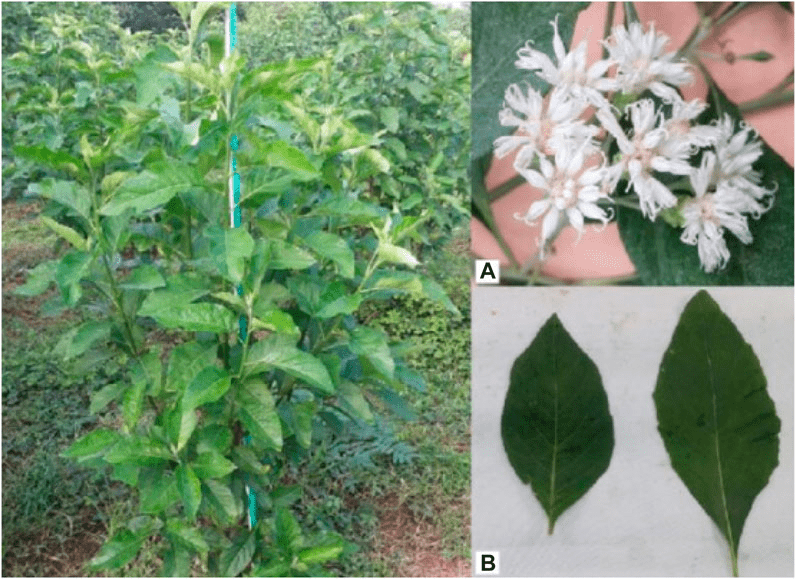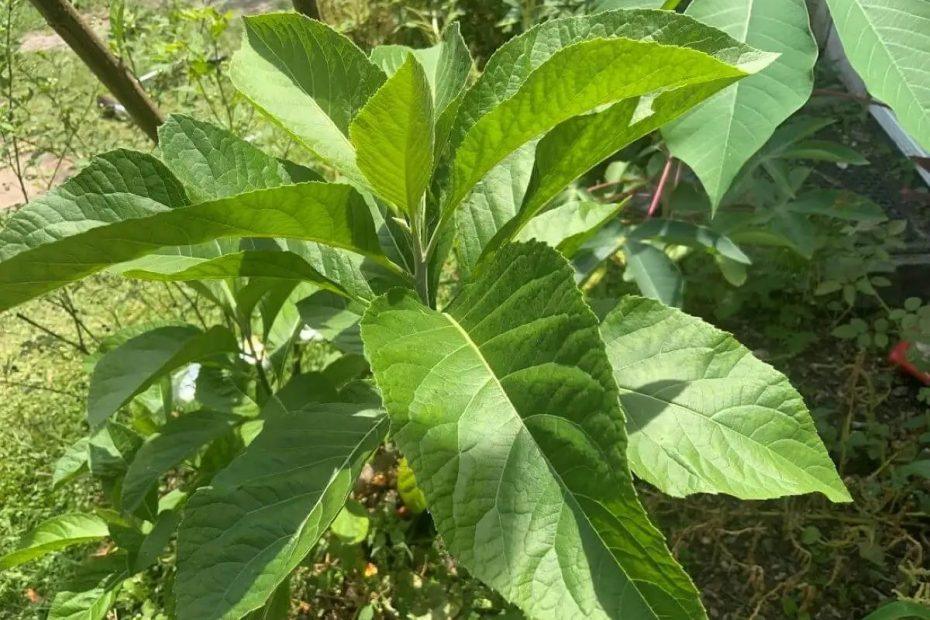Awolowo leaf, scientifically known as Vernonia amygdalina and commonly called bitter leaf, is a tropical shrub native to Africa widely valued in traditional medicine and cuisine for its bitter taste and potent health-promoting properties. Rich in vitamins, minerals, antioxidants, and bioactive compounds, it supports immune function, digestion, and overall wellness while offering potential therapeutic effects against various ailments.
Awolowo leaf (Vernonia amygdalina), often referred to as bitter leaf due to its distinctive bitter flavor, is a perennial shrub from the Asteraceae family thriving in tropical African regions. It has long been integral to traditional African practices for both nutritional and medicinal purposes, including treating malaria, diabetes, digestive issues, and infections.
Read Also: 12 Medicinal Health Benefits of Emilia Sonchifolia (lilac tasselflower)
Nutritional Value of Awolowo Leaf

1. Rich in Vitamins: High in vitamin A (for vision and immunity), vitamin C (antioxidant and immune support), vitamin E, and B vitamins (for energy metabolism and cellular health).
2. Mineral Content: Provides calcium (bone health), iron (oxygen transport), magnesium (muscle function), and potassium (blood pressure regulation).
3. Dietary Fiber: Abundant soluble and insoluble fiber aids digestion, prevents constipation, and promotes satiety for weight management.
4. Low in Calories: Ideal for nutrient-dense, low-calorie additions to meals supporting healthy weight maintenance.
5. Bioactive Compounds: Contains flavonoids, phenolic acids, saponins, alkaloids, and sesquiterpene lactones contributing to its medicinal effects.
Medicinal Properties of Awolowo Leaf
1. Antioxidant Effects: Neutralizes free radicals, reduces oxidative stress linked to aging, heart disease, and cancer.
2. Anti-Microbial Properties: Exhibits antibacterial, antifungal, and antiparasitic activity against various pathogens.
3. Blood Sugar Regulation: Helps stabilize glucose levels, beneficial for diabetes management through improved insulin sensitivity.
4. Anti-Inflammatory Properties: Inhibits proinflammatory cytokines and enzymes, alleviating pain, swelling, and chronic inflammation.
5. Digestive Health: Stimulates enzymes, relieves bloating, constipation, diarrhea, and supports gut microbiome.
6. Liver Support: Protects liver cells from damage, aids detoxification, and enhances hepatic function.
Culinary Uses of Awolowo Leaf
1. Traditional Dishes: Integral in African soups, stews, and meats for flavor and nutrition.
2. Soups and Stews: Adds bitter depth complementing other ingredients in popular bitter leaf soup.
3. Salads and Smoothies: Young tender leaves used fresh or blended for raw nutritional boost.
4. Herbal Teas: Dried leaves brewed into infusions for digestive and immune benefits.
Awolowo Leaf in Traditional Medicine
1. Traditional Remedies: Used for malaria, fever, gastrointestinal issues, infections, and wound healing across African cultures.
2. Preparation Methods: Fresh or dried leaves brewed as teas, crushed for poultices, or juiced for internal/external use.
3. Holistic Approach: Incorporated into broader dietary and lifestyle practices for overall well-being.
Benefits for Skin Health

1. Anti-Inflammatory Properties: Reduces irritation, redness in conditions like eczema or psoriasis.
2. Wound Healing: Antimicrobial action promotes healing and prevents infection when applied topically.
3. Acne Treatment: Controls bacteria and unclogs pores.
4. Hydration and Nourishment: Vitamins and minerals improve texture and glow.
Role in Digestive Health and Other Specific Benefits
Awolowo leaf aids digestion by promoting enzyme production, relieving bloating/gas, and offering anti-parasitic effects. It may support fertility through nutrient support for hormonal balance, egg/sperm quality. For ulcers, its anti-inflammatory properties soothe the stomach lining. While antimicrobial, it serves as complementary support for infections like staph but not a cure—consult professionals.
Read Also: 12 Medicinal Health Benefits of Oats (Avena Sativa)
Scientific Evidence and Case Studies on Awolowo Leaf (Vernonia amygdalina)

1. Antidiabetic effects: Preclinical studies show potent hypoglycemic properties, reducing blood glucose by up to 70% in models, improving insulin sensitivity, and managing dyslipidemia.
2. Anti-inflammatory benefits: Extracts inhibit proinflammatory cytokines/enzymes, reducing inflammation in pain, swelling, and associated diseases like arthritis.
3. Antioxidant activity: Demonstrates strong free radical scavenging, protecting against oxidative stress, hepatic damage, and chronic conditions.
4. Antimicrobial properties: Exhibits antibacterial, antifungal, and antiparasitic effects, supporting traditional use against infections and malaria.
5. Wound healing support: Facilitates re-epithelialization, faster closure, and reduced wound size in experimental models.
Summary of Awolowo Leaf Benefits
| Aspect | Key Details |
|---|---|
| Plant Description | Vernonia amygdalina (bitter leaf), tropical African shrub, bitter taste |
| Nutritional Highlights | Vitamins (A, C, E, B), minerals (Ca, Fe, Mg, K), high fiber, low calories |
| Main Health Benefits | Antioxidant, anti-inflammatory, antidiabetic, antimicrobial, digestive aid, liver protection |
| Medicinal Uses | Diabetes management, malaria, infections, wounds, skin health, fertility support |
| Culinary Applications | Soups/stews, salads, smoothies, herbal teas |
| Preparation Methods | Teas/infusions, juice, poultices, fresh/cooked in meals |
| Precautions | Consult healthcare provider; not a substitute for medical treatment |
Frequently Asked Questions
1. What is awolowo leaf?
Awolowo leaf, or bitter leaf (Vernonia amygdalina), is a nutrient-rich African plant used in traditional medicine and cooking for its health benefits and distinctive bitter flavor.
2. What are the main health benefits of awolowo leaf?
It offers antioxidant protection, anti-inflammatory effects, blood sugar regulation, digestive support, antimicrobial action, liver health, and potential aid in weight management and skin conditions.
3. How does awolowo leaf help with diabetes?
Its compounds improve insulin sensitivity, lower blood glucose levels, and manage related complications like dyslipidemia, as shown in preclinical studies.
4. Can awolowo leaf be used for infections?
Yes, its antimicrobial properties help combat bacteria, fungi, and parasites; traditionally used for malaria and infections, often as tea or topical application.
5. Is awolowo leaf good for skin health?
Its anti-inflammatory and antimicrobial effects reduce irritation, promote wound healing, treat acne, and nourish skin when consumed or applied.
6. How can I prepare awolowo leaf at home?
Wash leaves, boil for tea (10-15 minutes), juice fresh leaves, or add to soups/stews; start with small amounts due to bitterness.
7. Does awolowo leaf support weight loss?
High fiber promotes fullness, aids digestion, and its low-calorie nature supports calorie control and metabolism.
8. Can awolowo leaf help with fertility?
Nutrients may support reproductive health, hormonal balance, egg/sperm quality, but consult a professional before use.
9. Is awolowo leaf safe for everyone?
Generally safe in moderation, but excessive use may cause digestive upset; pregnant individuals or those on medications should seek medical advice.
10. How does awolowo leaf support liver health?
Antioxidants protect liver cells from damage, aid detoxification, and enhance function against toxins.
Do you have any questions, suggestions, or contributions? If so, please feel free to use the comment box below to share your thoughts. We also encourage you to kindly share this information with others who might benefit from it. Since we can’t reach everyone at once, we truly appreciate your help in spreading the word. Thank you very much for your support and for sharing!
Disclaimer: This article is for educational and informational purposes only. The health benefits described are based on scientific research and traditional knowledge. They ayre not a substitute for professional medical advice, diagnosis, or treatment. Always consult a healthcare professional before using any herb or natural remedy for medical purposes.
Read Also: Classification of Products and Marketing Strategies for Consumer Goods

